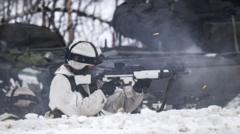The country's annual assessment highlights the dangers of foreign intelligence and domestic extremism in light of recent geopolitical developments.
**Sweden Labels Russia as Primary Security Threat Amid Heightened Tensions**

**Sweden Labels Russia as Primary Security Threat Amid Heightened Tensions**
Sweden's security service reports on the increased risks posed by Russian activities in the region.
Sweden's security agency, Sapo, has identified Russia as the most significant threat to its national security, emphasizing the Kremlin's aggressive posture towards western nations. In its latest annual report, Sapo noted that while Sweden's membership in NATO has bolstered its defense capabilities, it has also triggered a notable uptick in Russian espionage efforts. The agency asserts that Russia's intelligence operations are primarily aimed at destabilizing NATO unity, impeding Western support for Ukraine, and bypassing international sanctions, all amidst a broader landscape of hybrid warfare and violent extremism.
Charlotte von Essen, Sapo's head, warned of a "tangible risk" that Sweden's security environment may worsen unpredictably, urging citizens to remain alert to the rising tide of anti-state narratives and conspiracy theories that disrupt societal cohesion. Recognizing this as a critical moment, she highlighted the importance of not normalizing the ongoing destabilization threats.
The report also discusses increasing security challenges from other nations, including China and Iran, which have been accused of cyber intrusions and attempts to influence Sweden's domestic landscape. Iran, for instance, was previously accused of orchestrating a mass messaging campaign to respond to religious tensions, while China has been identified as targeting dissidents within Sweden.
Sapo raised concerns about various attacks on critical infrastructure, particularly undersea cables and gas pipelines, which have raised alarms within NATO, prompting enhanced monitoring. Other domestic threats include a diversification of terrorism sources, with rising radicalization among youth influenced by foreign powers.
Recent incidents, including a tragic mass shooting in Orebro that killed nine people, underline the urgency of Sweden's current security climate. As Sweden grapples with these multifaceted threats, it remains on high alert, with its terrorism risk level positioned at four out of five, accentuating the precarious nature of its national security landscape.
Charlotte von Essen, Sapo's head, warned of a "tangible risk" that Sweden's security environment may worsen unpredictably, urging citizens to remain alert to the rising tide of anti-state narratives and conspiracy theories that disrupt societal cohesion. Recognizing this as a critical moment, she highlighted the importance of not normalizing the ongoing destabilization threats.
The report also discusses increasing security challenges from other nations, including China and Iran, which have been accused of cyber intrusions and attempts to influence Sweden's domestic landscape. Iran, for instance, was previously accused of orchestrating a mass messaging campaign to respond to religious tensions, while China has been identified as targeting dissidents within Sweden.
Sapo raised concerns about various attacks on critical infrastructure, particularly undersea cables and gas pipelines, which have raised alarms within NATO, prompting enhanced monitoring. Other domestic threats include a diversification of terrorism sources, with rising radicalization among youth influenced by foreign powers.
Recent incidents, including a tragic mass shooting in Orebro that killed nine people, underline the urgency of Sweden's current security climate. As Sweden grapples with these multifaceted threats, it remains on high alert, with its terrorism risk level positioned at four out of five, accentuating the precarious nature of its national security landscape.






















